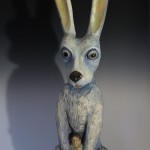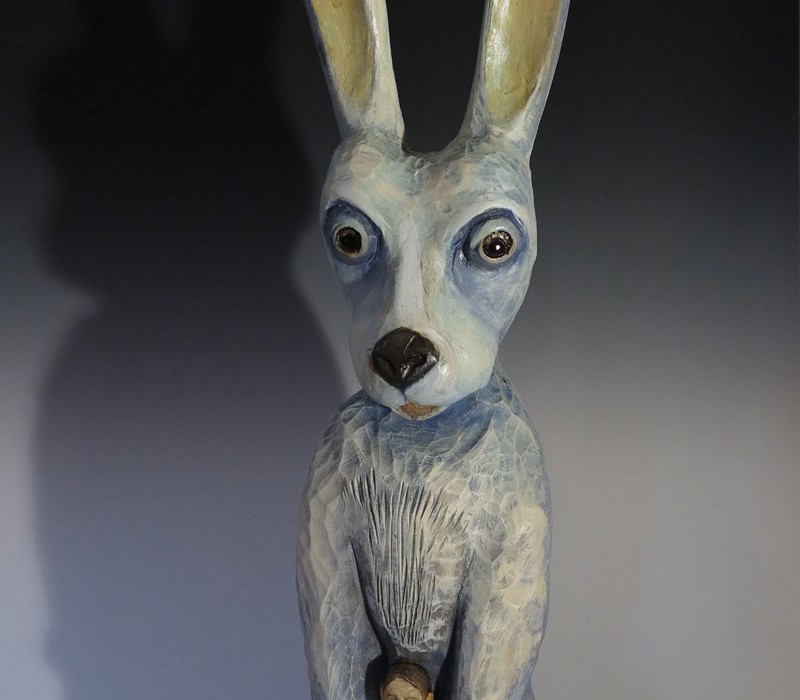Above: Brothers by Stan Peterson. Carved and painted basswood with faceted glass eyes. 34 x 9 x 9 inch. 2014. From the exhibit “Wild Hares and Other Tales” at Mark Woolley Gallery. To view the full version click on the thumbnail.

River Trout and Sour Cherry Jam
By Jessica Glenn
It is often hard to get hold of Skadi because of her husband, Fenris’s sickness. His affliction touches on every aspect of their lives. Particularly since she is a doctor, I wonder if living with a disease that she can’t cure leaves her feeling helpless. Though truly, it must have been the disease itself, which attracted Skadi to him in the first place. I always felt lucky when I got a chance to see her. Today, I was lucky.
Stirring her tea, Skadi cleared her throat.
“When I was little,” she said, “I lived in a small box in the kitchen of my grandmother’s house.”
“A box?”
“A box,” she answered. “I was a complete surprise when I was born. My mother, Janine, never had any symptoms of pregnancy and no clear memory of a biological father. She’s been confused ever since. She really couldn’t account for my existence, but obviously, I exist.
My mother never moved out of the cottage in France where she was born. Though grand-mère did her best to camouflage my mother’s existence, my grand-père was, well, he had a terrible compulsion. He tormented his wife and daughter nearly every time he saw them. When he was younger, grand-mère told me, “all he had wanted was sour cherry jam and river trout, but after his wedding, only this particular compulsion of his would give him any satisfaction.”
I smiled and Skadi smiled back. “Do you understand that?” she asked.
“I understand violent appetites, yes.” I nodded.
“My birth,” Skadi went on, “was a desperate new puzzle for them to solve. As my grand-père’s violence seemed to increase rather than decrease with age, I was certainly in danger as a newborn. My mother and my grandmother began to plan as soon as it became clear that the pains my mother was experiencing were birth pains. Janine had me without making a single other sound than the one word that would save me.
“Oven.”
The oven was the only place where it was guaranteed that grand-père would never look and so that’s where I spent my childhood. My mother made me a box decorated with soft, colorful scraps of fabric. I played with the small tinkly bells tied to the edge that were too soft to attract attention and I always knew not to cry out.
When I was five and desperate for any sort of companionship, my mother brought home an orphaned wolf pup she had found in the forest while collecting snails. She and grand-mère fed the pup in the kitchen and let me reach my hand out of the oven to stroke the wolf’s nose. He was not afraid of anything.”
“In the meantime,” Skadi continued, “my grand-père bought a Papillon pup. His favorite new entertainment was to croon to the small dog for hours about his undying love and adoration. He cooed and whispered to the little bitch that she was all he had ever wanted in a female, and that his wife and daughter ought to take lessons if they ever expected to be lovable.
Sometimes my grand-père insisted at the very least that they try to be as lovable as the dog and made the women take off their shoes and stockings and skirts and underpants and get down on the floor to mimic his lovable bitch wagging her shaggy tail. Then of course, grand-père would shake his head in revulsion and kick at them with those mud caked boots, grinning at each dull thud. My mother and grand-mère wouldn’t make eye contact for days after these demonstrations from the head of their household.
I never actually saw grand-père, but I could smell him and knew his phlegmy laugh. One day when I was about seven, the wolf was licking my hands and face through the oven door. I remember thinking how much I adored him; every hair, every tail wag, every woodsy breath. As if completing something final, Wolf walked out of the kitchen for the first time, pushing his head through the swinging door, and looked behind at me only once. With a gesture as casual as popping off the head of a dandelion, he bit the head off of the Papillon bitch.
In the uproar that followed, grand-père saw only one answer. He prepared to kill Wolf slowly and anticipated every pleasure and pitfall with care. He didn’t scream or beat him, simply gathered a scalpel, a hairbrush, a wrench, a sharpened pencil, a vat of lye, a razorblade, and several other items in a pile on the parlor rug.
Wolf watched, unconcerned. He sat back on his haunches observing the preparations, chewing on the gristle of the Papillon’s head. When the pile of tools seemed as complete as it could be, my grand-père grabbed a choke collar leash belonging to his dead dog and began to put it round the wolf’s neck.
My wolf looked amused, then jumped. He jumped so far and with such grace it looked as if he were flying. The nylon lead broke like a thread and Wolf traveled through the front window as if it were liquid, through the air, and through the front yard of the property landing on the outside of the high iron fence that surrounded our cottage.
In the commotion, the door to the kitchen was left open, and so was the oven. I watched the wolf fly without much surprise though quite a lot of sadness. I was alone with the timid, worn down women of my family, and I decided then that anything was better than that.”
Skadi’s husband, Fenris is a large man with a large voice. He is unable (or unwilling, most said) to stand. He had remained on all fours as long as I have known him, which is more than two decades. He dropped out of college shortly before I did and we both hung around in the student center, scoring drugs and hanging out. At that point, the fact that he growled, snarled, and occasionally bit seemed pretty cool. It was done in a very chill way, and he seemed like the perfect collegiate wild man at the time.
But his long nose and antagonistic gaze still make me drop my own eyes to the floor rather than meet his. When I come over to their house unexpectedly, his hackles rise and he howls uncontrollably, face up toward the moon.
Fen forces Skadi to stay upright all of the time and never allows her to bend down. The tooth marks covering her body are unmistakable, but she doesn’t seem to be bothered since she never complains. Skadi takes careful care of Fenris, feeding him a medicinal stew concocted from an old naturopathic text book. He grudgingly eats her stew made of the footstep of a cat, the roots of a mountain, a woman’s beard, the breath of fishes, the sinews of a bear, and a bird’s spittle, in a silver bowl each morning and night. So Skadi said, anyway. While Fenris could not in any way be considered tame, Skadi regards being alive a success over the world. Cautioning me mildly against my tendencies to jump over the nearest cliff into a lake of broken glass, Skadi’s lack of fear is terribly comforting.


Art Carts hits Hawthorne this weekend - PDX MagazinePDX Magazine
[…] Melloy Eli Lewis Jennifer Mercede Emily Kosta Linda Rand Gesine Kratzner Kate Altermatt Kelli […]